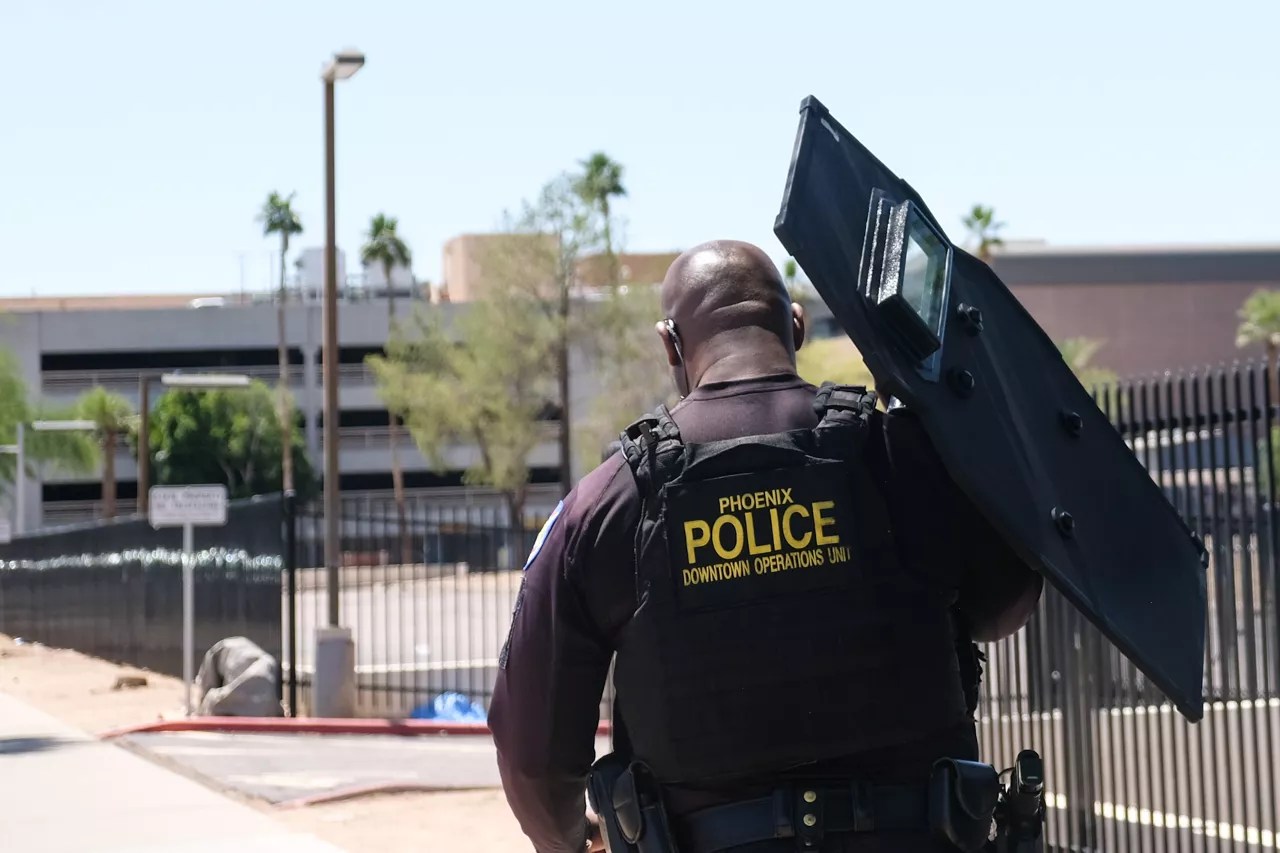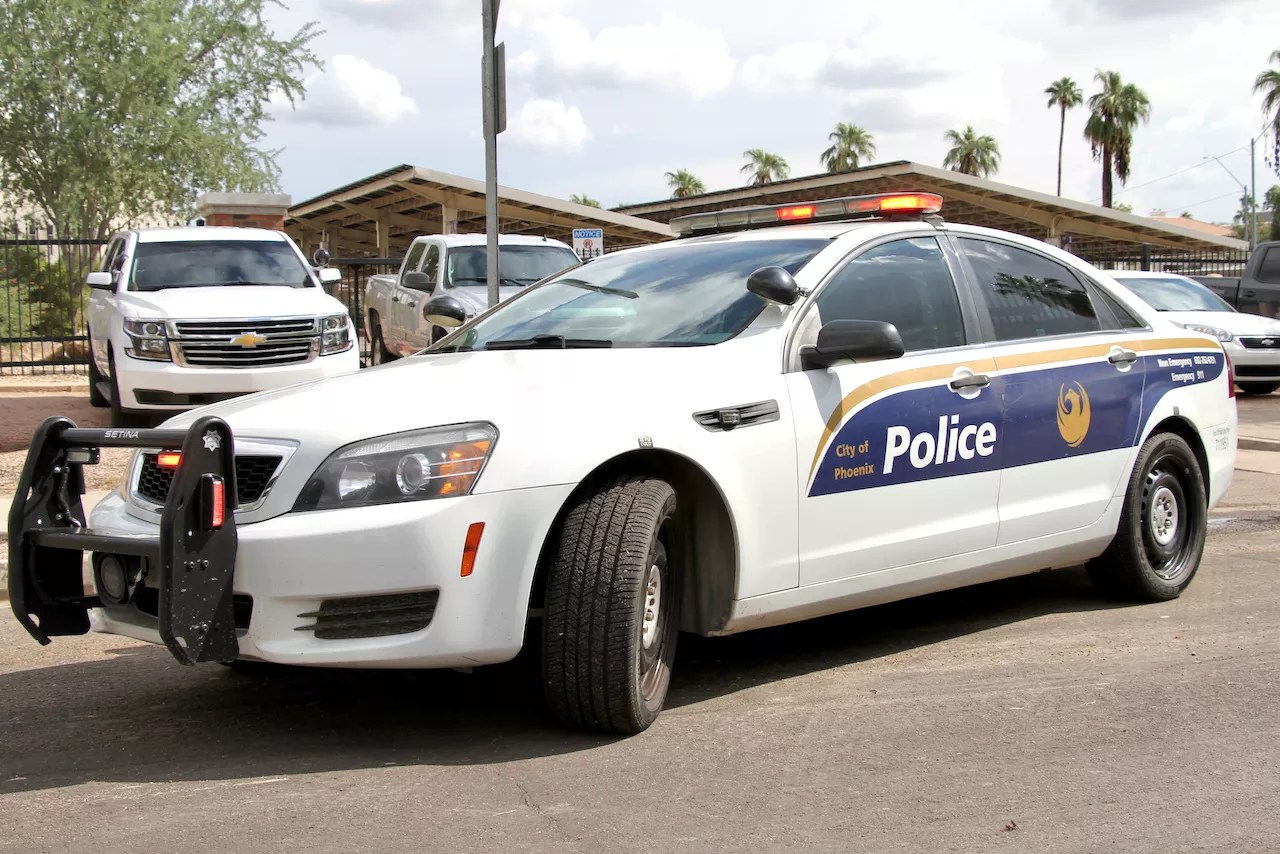
Katya Schwenk

Audio By Carbonatix
The Phoenix Police Department has a reputation as one of the most violent law enforcement agencies in the country. A new study of fatal police encounters data backs that up.
Since 2013, encounters with Phoenix officers have caused the death of 173 people, according to a report from the accident and injury firm Gammill Law. That’s the second-highest total in the country behind the Los Angeles Police Department.
The study used data from Mapping Police Violence, a website that has become widely known as the foremost tracker of police killings that have happened in the United States since 2013. It has utilized information from police and media reports to create a comprehensive, though not complete, picture of law enforcement violence. Estimates suggest the database captures 92% of police killings.
Researchers at Gammill Law created a ranking of police killings for the nation’s largest 100 law enforcement agencies, calculated by the size of the population they serve. Here are the five deadliest police forces, per the study:
- Los Angeles Police Department – 199 deaths
- Phoenix Police Department – 173 deaths
- Houston Police Department – 128 deaths
- New York Police Department – 126 deaths
- San Antonio Police Department – 106 deaths
For those who have paid attention to policing issues in Phoenix, the study’s findings should hardly be surprising.
From 2018 to 2023, the department had one of the highest rates of fatal shootings among major cities across the country. During that time, there were 74 fatal shootings. Police shot and killed 12 people in 2023 and 14 in 2024. Four people have died after run-ins with Phoenix police so far this year, three of whom were shot.
In June 2024, the Department of Justice completed a years-long investigation into the Phoenix Police Department and its history of unconstitutional policing. In a blistering 126-page final report, the DOJ found that from 2016 to 2022, Phoenix police regularly committed a litany of civil rights violations, including using excessive and unnecessarily deadly force.
The DOJ said that the department taught officers tactics that were “dangerous, unnecessary and unreasonable,” including that all force – even deadly force – would lead to de-escalation. One police official told the DOJ that this distorted view was “ingrained in the vernacular of the department.”
In addition, the DOJ found that officers fired their weapons at people who presented no immediate threat and that officers shot when their own “reckless tactics” magnified their own risk. Officers also improperly used choking tactics, including on people who had not committed a crime.
The DOJ added that officers unreasonably delayed rendering aid to people they shot and used force against people who were already incapacitated. Once, the DOJ said, cops shot a woman 10 times and waited nine minutes to approach her immobile body. She died of her injuries.
Between 2008 and 2018, Phoenix approved $26 million in settlement money for police violence in 191 cases. In November 2023, the city paid $5.5 million to the family of Ali Osman, who was killed after throwing rocks at an officer during a mental health crisis in September 2022.

The city of Phoenix has resisted calls for independent oversight of its police department.
Matt Hennie
Calls for accountability
In the lead-up to the report’s release, the city of Phoenix pushed back publicly against the suggestion that its police force required independent oversight, as sought by the DOJ. Its councilmembers have argued – as did former police Chief Michael Sullivan in a closed-door December 2023 meeting with the press – that the department can reform itself more effectively.
After issuing its report, the DOJ vehemently disagreed and threatened to sue if Phoenix didn’t accept any oversight mechanism. Now that the Trump administration has taken office, though, the idea of independent oversight is dead in the water. Several Republicans, including centrist Republican and Maricopa County board chairman Thomas Galvin, have called on the DOJ to back off Phoenix police.
But in light of Phoenix’s high tally of police killings, some public officials have attempted to bring more accountability and transparency to deaths at the hands of officers.
In January 2024, Democrats Anna Hernandez and Analise Ortiz – serving then as a state senator and representative, respectively – introduced a Family Bill of Rights. It aimed to guarantee that family members of those killed by officers “have free, quick and unredacted access to information, materials and findings that are relevant to the victim’s injury or death,” including unedited body camera footage from officers.
The bill – which was never heard in the Arizona Legislature – was informed by the personal experience of Hernandez, whose own brother was killed by Phoenix officers in 2019.
“As we navigated the system in looking for answers and accountability on police violence, we faced endless roadblocks in obtaining police reports, investigative reports, personal belongings of our loved ones and access to resources,” Hernandez said at a press conference introducing the bill.
Months later, Hernandez announced what would be a successful run for the Phoenix City Council. Ortiz called Hernandez “the only candidate who can be trusted to advocate for meaningful transparency, accountability and reform for the Phoenix Police Department.” Hernandez took office in April as the most outspoken critic of Phoenix police the council has seen in years and will now have a say in reforming the department. Notably, though, Hernandez has also expressed skepticism about the efficacy of federal oversight.
Phoenix police have continued to face issues since the DOJ report was released. Last year, an ABC 15 report revealed two Phoenix cops had beaten and arrested a deaf, Black man with cerebral palsy, jailing him for 24 days on bogus assault charges. Arrest video publicized by the station resulted in the Maricopa County Attorney’s Office dropping the charges against the man, who is now suing Phoenix over the incident. Three cops involved in the bullshit arrest were suspended by the department for only 24 hours.
Those suspensions were some of the last acts of Chief Michael Sullivan, who had been helming the department on an interim basis since 2022. In April, Sullivan announced his resignation and abandoned his candidacy for the permanent gig. Instead of proceeding with three other finalists for the position, the city chose to restart its police chief search from scratch, leaving Executive Assistant Chief Dennis Orender running the department.